News & Media
Mbeki: Blue economy critical for Africa's renaissance
As part of Unisa’s engagements leading up to the 15th Annual Thabo Mbeki Africa Day Lecture on Saturday 24 May 2025, representatives of various governments, business, academia and industry gathered in Dar es Salaam on 20 May 2025 to engage on the theme Harnessing the Blue Economy and Tourism for Africa's Renaissance. Hosted by Unisa and partners, this strategic dialogue interrogated one of Africa’s most underleveraged endowments – its oceanic and littoral geographies.
Encircled by the Indian, Atlantic and Southern Oceans, as well as the Mediterranean and Red Seas, Africa occupies a maritime vantage of unparalleled strategic significance.
The programme participants gave a perspective to this theme, each richly delving into areas such as transformation, policy, intercontinental agreements and the specific opportunities available for South Africa and Tanzania.
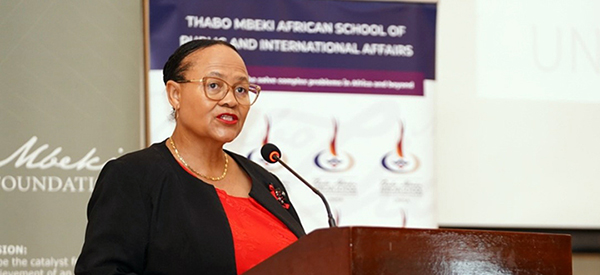
Prof Eunice Seekoe, Acting Vice-Principal: Teaching, Learning, Community Engagement and Student Support
In her welcoming remarks, Prof Eunice Seekoe, Acting Vice-Principal: Teaching, Learning, Community Engagement and Student Support, reaffirmed the university’s unwavering commitment to advancing a transformative, ocean-centred development agenda. She articulated the imperative of embedding blue economy paradigms within higher education curricula and deepening their resonance through meaningful community engagement.
Blue economy critical for Africa’s renaissance
Unisa Chancellor and former South African President, Dr Thabo Mbeki, emphasised that the ocean economy is an area of socio-economic activity, which, he said, "is of great significance for the future of the African continent." However, Mbeki stressed that a lot of groundwork still needs to be done to conscientise people about the economic activities associated with the ocean, beyond fishing, and particularly those living inland. He added: "People living in non-coastal areas have little knowledge about the benefits of the blue economy. Therefore, they must be made aware of the benefits thereof in order to harness economic growth, job opportunities, tourism, and maritime trade. Africa’s curricula on marine studies must be expanded. The blue economy is essential for Africa’s renaissance."
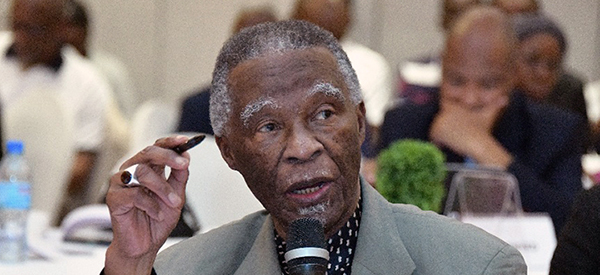
Dr Thabo Mbeki, Unisa Chancellor and former South African President
The blue economy as a catalyst for regional transformation
Prof Edith Phaswana, Acting Executive Dean of the Thabo Mbeki African School of Public and International Affairs (TM-School), eloquently situated the blue economy within the broader tapestry of Africa’s renewal agenda, asserting that the continent’s future must be authored by its own intellectuals. "We need a continental research ecosystem where African scholars, across all nations, actively contribute to reimagining governance, sustainability, and justice in a rapidly shifting global order," she said.
The TM-School’s Prof Anthoni van Nieuwkerk challenged the continent to redefine its maritime identity, urging scholars and policymakers alike to confront the pressing question: "How do we recover what was lost and forge a sovereign relationship with our marine inheritance?".

From left: Prof Anthoni van Nieuwkerk, Thabo Mbeki African School of Public and International Affairs; Joseph Butiku, Chairperson of the Mwalimu Nyerere Foundation; Dr Lucy Shule, Director of Studies: Tanzania National Defence College; and Prof Godwell Nhamo, Unisa Department of Economic and Management Sciences
Deputy Permanent Secretary for Foreign Affairs and East African Cooperation, Ambassador Said Shaibu Mussa, conveyed unequivocal support for the deliberations, affirming Tanzania’s commitment to advancing the blue economy as a catalyst for regional transformation. He acknowledged the immense promise held within Africa’s maritime and aquatic domains, while also confronting the complexity of the challenges that impede their equitable utilisation. In this regard, he issued a clarion call for bold, innovative, and contextually grounded solutions that harmonise ecological stewardship with socioeconomic progress.
Maritime security and economic resilience within Africa
In a stirring address at the roundtable, Joseph Butiku, Chairperson of the Mwalimu Nyerere Foundation, invoked the profound urgency of economic liberation for Africa. Framing water as a strategic economic asset, he posed a transformative question: "How do we strengthen our economy using water?". His intervention underscored that political emancipation, while crucial, remains incomplete without genuine economic sovereignty – a vision intrinsic to Africa’s Renaissance.
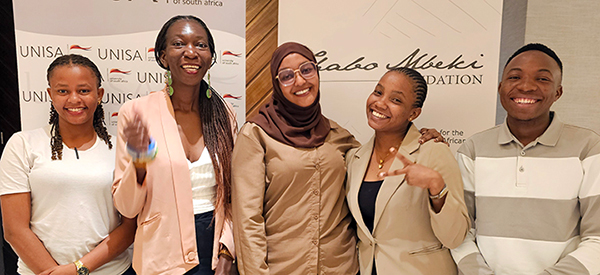
Marine Sciences and Maritime Engineering students from University of Dar es Salaam and Maritime Institute
Dr Lucy Shule, Director of Studies at the Tanzania National Defence College, illuminated the intrinsic link between maritime security and economic resilience within Africa’s expansive oceanic landscape. With 39 of 54 African nations classified as coastal states and over 13 million square kilometres of exclusive economic zone, the continent possesses immense yet underleveraged marine capital. Shule juxtaposed this wealth against the persistent reality that nearly half of Africa’s population remains mired in extreme poverty – a sobering paradox demanding transformative ocean-based solutions.
In his seminal address during the discussions, Prof Godwell Nhamo of Unisa’s Department of Economic and Management Sciences delivered a compelling call for Africa to reimagine its engagement with the ocean and maritime sectors. Framing the blue economy as a pivotal pillar of the continent’s renaissance, he stressed the foundational role of sustainability and conservation, aligning with global initiatives such as Project 30x30.
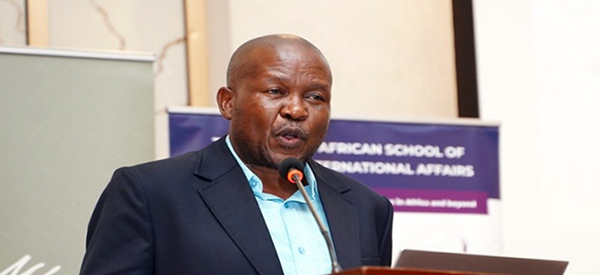
Prof David Mello, Thabo Mbeki African School of Public and International Affairs
Concluding with a spirited and solution-oriented question-and-answer session, expertly moderated by the TM-School’s Prof David Mello, the dialogue on Africa’s blue economy crystallised into a call for transformative action. Participants engaged deeply with the imperative of reimagining the continent’s maritime future – one anchored in climate resilience, technological innovation and inclusive development.
* By Lesedi Ledwaba, Communications Officer, Office of the Unisa Principal and Vice-Chancellor
** Photography by Shooheima Champion, Multimedia Centre
Publish date: 2025-05-22 00:00:00.0


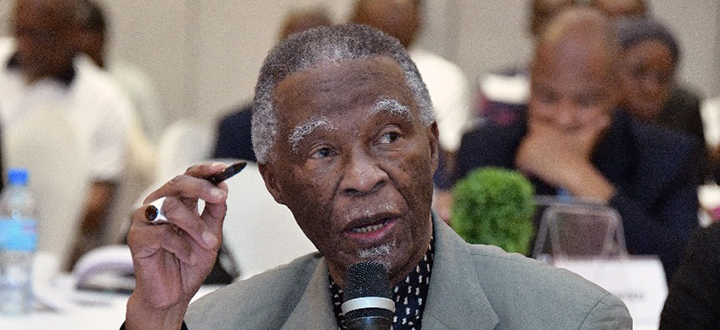 Mbeki: Blue economy critical for Africa's renaissance
Mbeki: Blue economy critical for Africa's renaissance
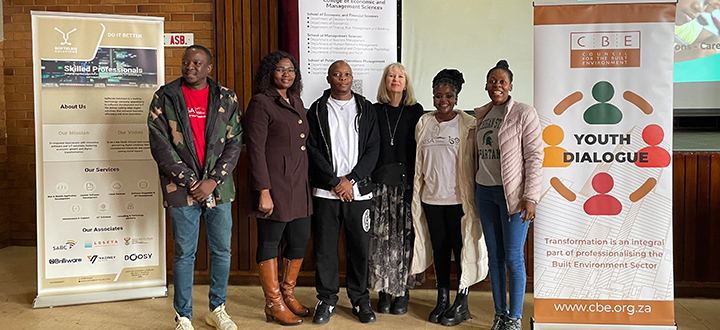 Unisa unlocks futures for learners with disabilities
Unisa unlocks futures for learners with disabilities
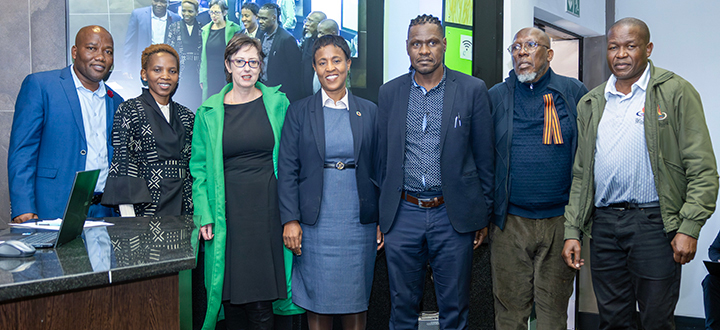 Steering the G20 in uncertain times: South Africa's leadership, global governance and local priorities
Steering the G20 in uncertain times: South Africa's leadership, global governance and local priorities
 Unisa PhD graduate earns spot at prestigious Lindau Nobel Laureate Meeting
Unisa PhD graduate earns spot at prestigious Lindau Nobel Laureate Meeting
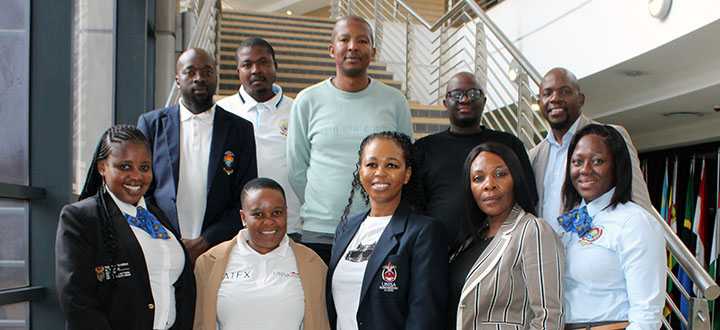 TVET college visits Unisa for alumni engagement benchmarking
TVET college visits Unisa for alumni engagement benchmarking